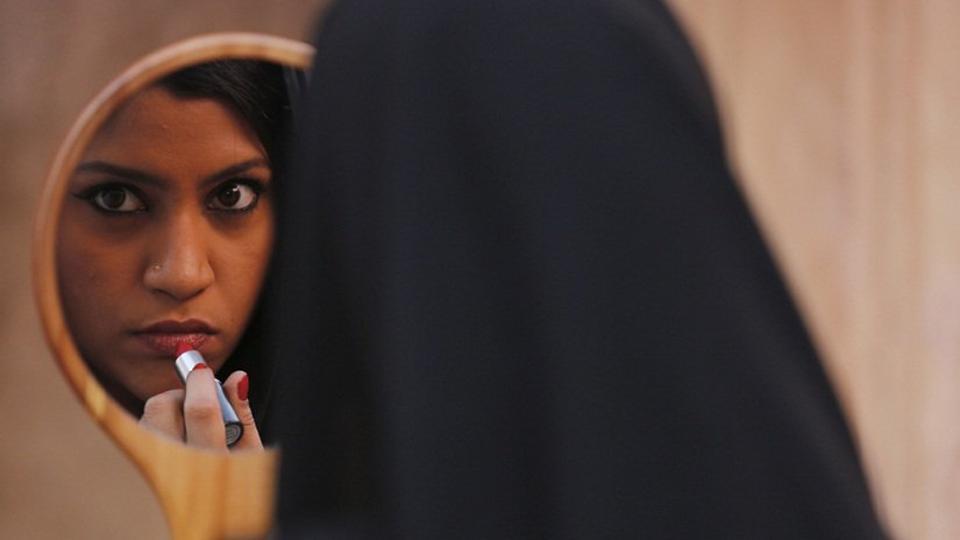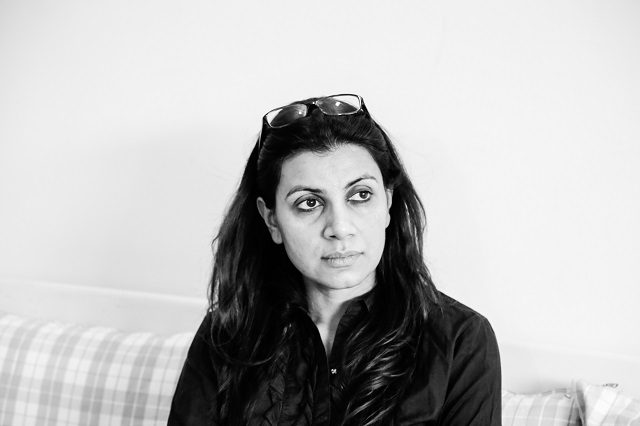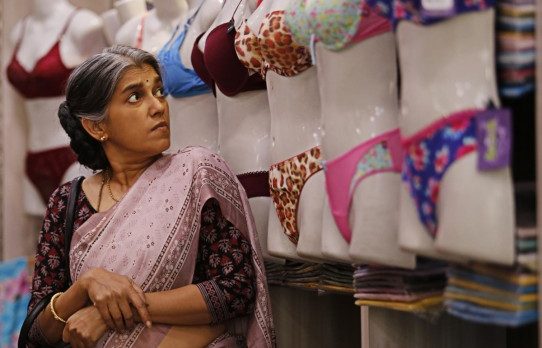Alankrita Shrivastava: ‘CBFC Needs Lessons in Gender Politics’
Lipstick Under My Burkha director on why CBFC’s refusal to give her film a certificate is like “telling women to shut up”

Konkona Sen Sharma in ‘Lipstick Under My Burkha.’
Last week, India’s Central Board of Film Certification (CBFC) informed Prakash Jha Productions that they would not be certifying their latest release, Lipstick Under My Burkha. Though the film has already won multiple awards abroad and an Oxfam award at home, the CBFC’s refusal to certify it means that it will not be screened in India.
“It is very, very ironic that a film that is being appreciated the world over and being recognized for the feminist piece of work that it is, is being shut down in India for being too feminist in nature,” says the film’s director, Alankrita Shrivastava. “It’s very telling about our society.”
Shrivastava is currently in Glasgow, where Lipstick is being screened at the Glasgow Film Festival. We spoke to her over the phone to discuss her opinions on why her film was singled out over others like it, whether or not the CBFC is capable of coherent thought, and what we need to do to secure freedom of expression with regards to women’s sexuality.
Did you have a feeling that this might happen? Or was the CBFC’s decision totally out of the blue?
I was not at all expecting that they were going to refuse certification altogether. Last year films came out like Parched, and Pink, and the year before that there was Margarita with a Straw, and there was Qissa, so I thought it’d be fine. In fact, after the first screening, the committee told me, we feel that the film is really hard-hitting, it tells you the true reality of Indian women. They said that, and then they said, you know we have a divided house, we’ll get back to you in writing. And when they got back to me in writing, they wrote that strange letter about the film being “lady-oriented.” After receiving that letter, we applied to a revising committee, and I had a second screening for them, and then Pahlaj Nihalani [Chairperson of the CBFC] also watched the film. At the end of that screening, he told me very categorically that there was a unanimous decision that they would not be certifying the film.

Alankrita Shrivastava: “If as citizens of India, we have the right to vote, then as citizens of India why do we not have the right to choose the films we want to watch?”
What do you think sets Lipstick Under My Burkha apart from these other movies that came out, like Pink, that were ultimately certified?
I really don’t know what was going on with [the CBFC] at the time [of those films]. But with my film, I feel sure that they’re not happy with the fact that it portrays an alternative point of view. It’s a film made with a very clearly female gaze, and at its core it’s got a very strong feminist impulse. I mean, in such an uneducated way, they’re labeling it as “audio-pornography.” It’s a completely patriarchal mindset. Because if you look at the kind of films they pass ”“ I don’t have a problem with it, I want all films to be passed; there should be no censorship ”“ but I’m saying that if they’re OK passing everything else, why do they have a problem with something that is feminist in nature? Something that’s different from the mainstream narrative? They’re uncomfortable with the idea that women can have agency over their own lives, dreams, desires, bodies.
It’s completely an attack on freedom of expression. If we make films, and we find that our films are being banned, then we’re going to think a hundred times before we create any work of art. In a country that says we have freedom of expression, that is quite ridiculous. I also feel that the freedom of expression seems to particularly not apply to women. The CBFC’s refusal to give the film a certificate is them telling women to shut up, like, ”˜Your voices are not important, your thoughts are not important, your desires are not important, your perception, opinion and perspective is not important.’
What can we do to change the situation around freedom of speech, especially with regards to women?
There should be no censorship. We should have certification, and even for certification I think that these guys need an education. They should read some books, they should go for classes where they’re taught things about sensitivity towards gender, gender politics, things about gaze, things about storytelling. They need lessons in films that they need to see, so that when they’re watching a film they don’t have mainstream Bollywood narratives as their only reference.
In banning your film, the CBFC sure makes it seem like they thought that your film was pretty powerful and that it would have a strong effect on society.
I’m really not sure what they think. I don’t know if they have any coherent thought. And I really mean that. Because of the kind of letter they sent, and the kind of reaction they had. I would love to believe that they think it’s a really powerful film that could really change society and therefore that they should stop it. Maybe that is true, actually, because I never thought that it was a very powerful film. Honestly speaking, it’s only because this controversy has risen up that I’ve felt that my film is important. I wasn’t thinking that it was going to become some defining thing, but in the last 2-3 days, there’s been so much discussion. I’ve never heard the media talking about things like gaze; I’m so happy that some of these things are being discussed. But when I made the film, I wasn’t thinking about its ramifications, either in terms of censorship or in terms of sparking off so much debate. For me, it was just a film that I wanted to make.

Ratna Pathak Shah plays a widow rediscovering her sexuality in ‘Lipstick Under My Burkha.’
It’s pretty clear that the CBFC view “lady-oriented” films as a bad thing. Do you think that this a common perception of female sexuality, or is the CBFC really far removed from what the public actually believes?
I think both things are true. We live in a very complex country. The CBFC are also people who live in society; there must be other people who have the same views. But on the other hand, what is so overwhelming is that we’re getting so much support for the film, and everybody is so clear about it. And you know, let us choose if we want to see the film or not. If you’ve turned 18, you’re allowed to vote. It’s a really serious job: you’re electing the leader who’s going to govern your country. If as citizens of India, we have the right to vote, then as citizens of India why do we not have the right to choose the films we want to watch? In any case, the CBFC is meant to be a board for film certification. They’re taking on the role of being the moral guardians for the country. It’s been like that for so long, and we call them the “censor board.” They’re not supposed to censor things. They’re supposed to certify things. So why should they decide what the audience can watch, and how have they decided that the Indian audience is not mature or not equipped? I mean, the whole world is equipped to watch whatever kind of cinema, but in India the Indian audience is too dumb for it? That’s so offensive.
There’s one section of the CBFC letter which mentions a “sensitive touch about one particular section of society.” Are they referring to Muslims?
I don’t know, because they haven’t even made that clear. And even if they are, I feel the intent of the film clearly has nothing to do with religion. Two characters are Hindu and two are Muslim, and it’s really about the fact that as women, we all struggle in our own ways. And it’s not like there aren’t Muslim women in our country. Should their stories not be told? Should they not be seen? We live in a secular country. And we do have Muslim characters in our movies; there’s Raees [2017] where Shah Rukh Khan plays a Muslim character. The core of Lipstick is how women struggle in a patriarchal society and how they try to break through and subvert the patriarchy. I can see what the CBFC are trying to do: they’re deflecting the real issue [by making it about Islam].
Are you planning on appealing the decision to FCAT (Film Certification Appellate Tribunal)? What should our next steps be?
Yeah, we have to appeal to the Tribunal. Right now, what’s happening is amazing. Women are coming out and posting stuff on Facebook, writing on their blogs, tweeting. They are making themselves heard. The best thing is to continue having these conversations and not stop talking about it. It’s a really uphill task, and we have to really be at it, otherwise nothing’s going to change. When everybody speaks up, it starts to matter. I’m very overwhelmed by the reaction; it means that in our country, people are spirited, and people are looking to live in a way where we have the choice to watch the films we want. It’s very, very encouraging.
Watch a trailer for ”˜Lipstick Under My Burkha’:





